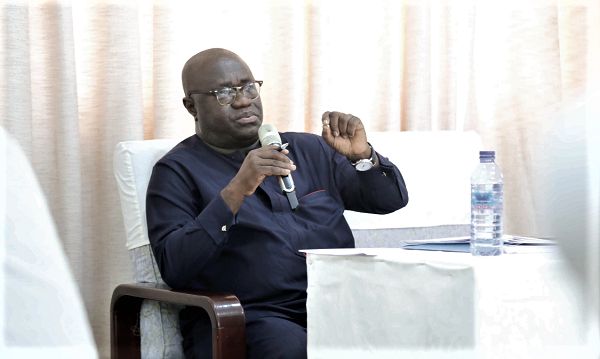
Don’t rush to vigilantism disbandment — Dr Kwasi Aning
The Director of the Faculty of Academic Affairs and Research of the Kofi Annan International Peacekeeping Training Centre (KAIPTC), Dr Kwesi Aning has told the Justice Emile Short Commission of Enquiry into the Ayawaso West Wuogon by-election violence that efforts to disband vigilantism should not be rushed.
Rather, he said, such an exercise required a long process that would restore trust in the security forces.
Dr Aning said the institution of legislation to disband such armed and violent militia groups, as recommended by the President, was not enough to tackle the challenge due to the deep mistrust of and suspicion towards statutory security agencies.
“Legislation will not help this process. Vigilantism has got roots in our society, created economic incentives and people use that and, therefore, we need a sober long-term process in which we create trust first, come round the table, start a conversation and deliberate on specific issues, and these take time,” he said.
Short-term measures
Responding to a question by the Chairman of the commission, Mr Justice Emile Short, on what immediate and long-term steps he would recommend to address vigilantism and its recurrence prior to the 2020 elections, Dr Aning said while a long-term solution was critical, there was the need to put in some interim measures ahead of the 2020 general election.
He stated that as part of a short-term recommendation to curtail the menace of vigilantism in the country, there was the need to bring sanity back into the security system.
“Let us know who is responsible for what and takes whose orders, so that when the security hierarchy fails, somebody is held accountable. When we have statutory security forces who are paid for, housed, transported by the Republic, it is crucial that they are permitted and allowed to perform their functions,” he said.
Align security structures
Dr Aning stated that having statutory security forces that did not know the existence of other forces that were commanded and ordered to perform in the public space in the manner portrayed during the Ayawaso West Wuogon by-election set a bad precedent for future elections.
He blamed the unfortunate occurrence on the lack of coordination from the top hierarchy of the National Security and decision-makers, leading to the provision of equipment to non-statutory groups that the formal forces did not have.
“That breakdown in order in the hierarchy is one of the most serious threats if we do not correct it before 2020.
In the short-term, we need to bring security structures in alignment because it should not be possible for a junior minister or any other person to move those troops well-armed, well-fed, and well-equipped with logistics to perform the way they did,” he said.
International support
He pointed out that due to the deep level of suspicion among political parties towards the security apparatus, Ghana should not shy away from inviting an honest broker such as the United Nations and the African Union to help deal with vigilantism under the demobilisation, demilitarisation, disarmament and reintegration programme (DDDR).
He stated that violence was so much glorified in Ghana, where there were between 1.5 million and two million unregistered guns, including local and smuggled guns, which were posing existential threats, as they were in high demand by militia groups in the country.
Politicians are to blame
Dr Aning added that today the names of the militia groups symbolised war, as they had the capacity and willingness to use violence against the state in a swift and flexible manner.
He added that the country was seeing the transformation of such violent groups into organised ones and were “willing and prepared to take on the power of the state”.
“We have seen instances when ministers of state had been threatened and this is a development which a couple of years ago would be impossible, as no one would dare to attack a representative of the state.
He explained that prior to the 2016 general election, politicians could not stand up to disclose their intention to form vigilante groups, as they were perceived as “nasty and intangibles no one wanted to align with”.
However, Dr Aning said, today politicians had pride and willingness to boldly tout their intentions to establish vigilante groups that had currently become more aggressive.
John Boadu
Taking his turn before the commission, the General Secretary of the New Patriotic Party (NPP), Mr John Boadu, blamed the failure of the security agencies to deliver desirably as one of the reasons political parties were compelled to fall on some groups that were affiliated to their parties to offer supplementary security services.
However, he was quick to clarify that the NPP did not own or sponsor any groups known to be vigilante groups, saying that they were rather members of the party.
He expressed the NPP’s readiness to collaborate with all political parties to support the effort to disband vigilante groups in the country.
